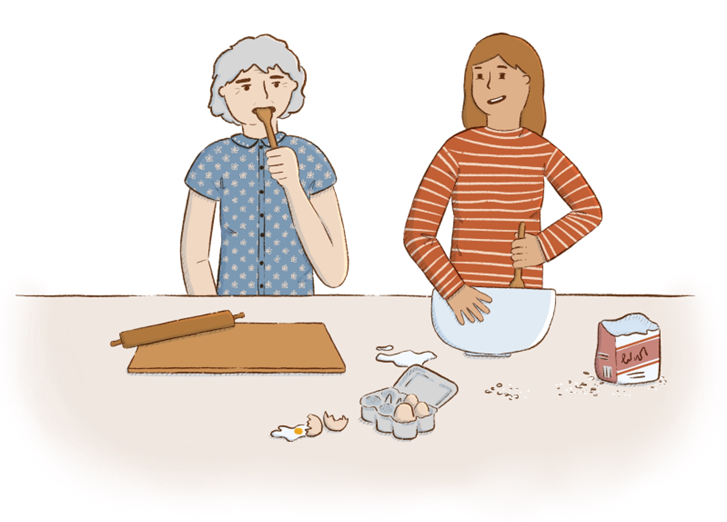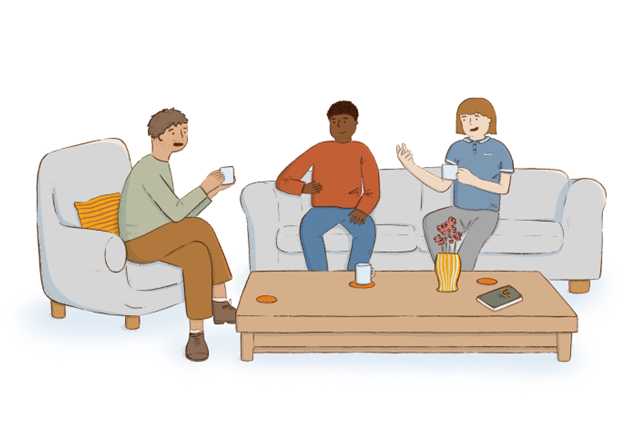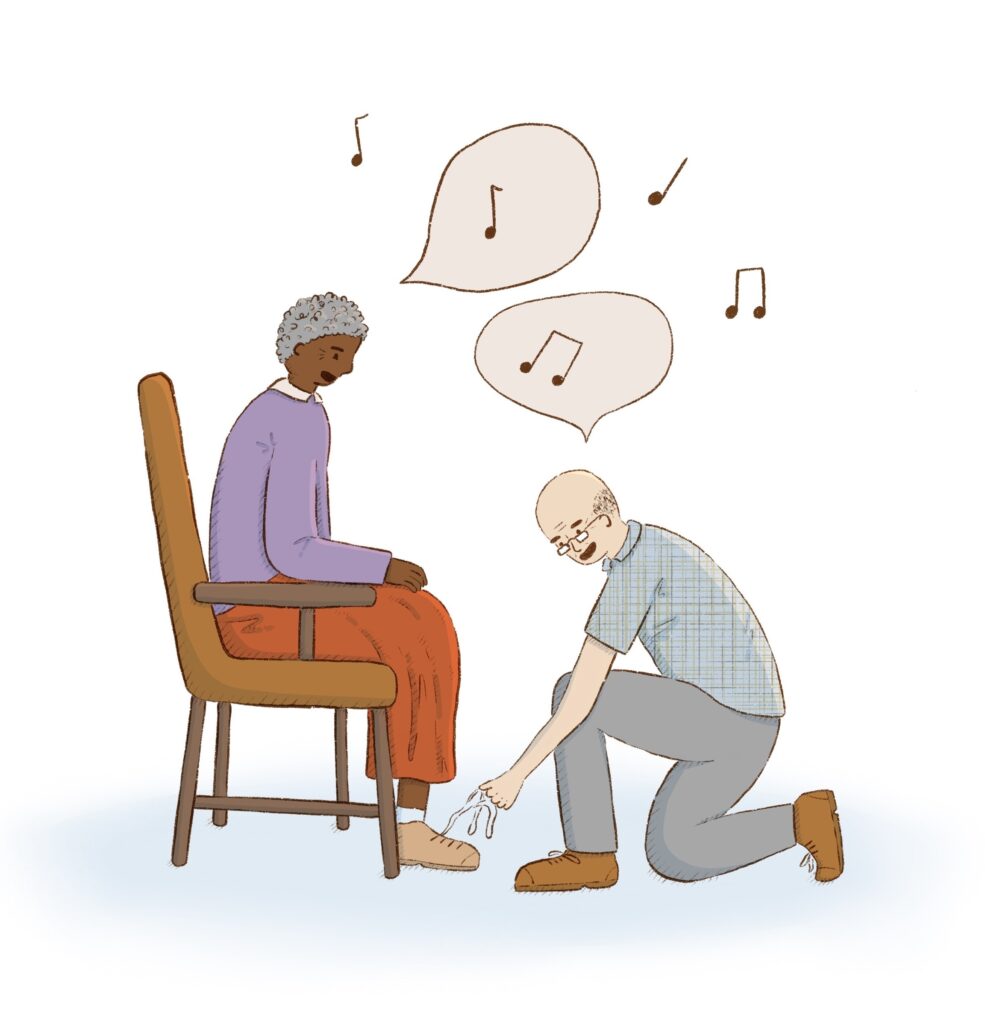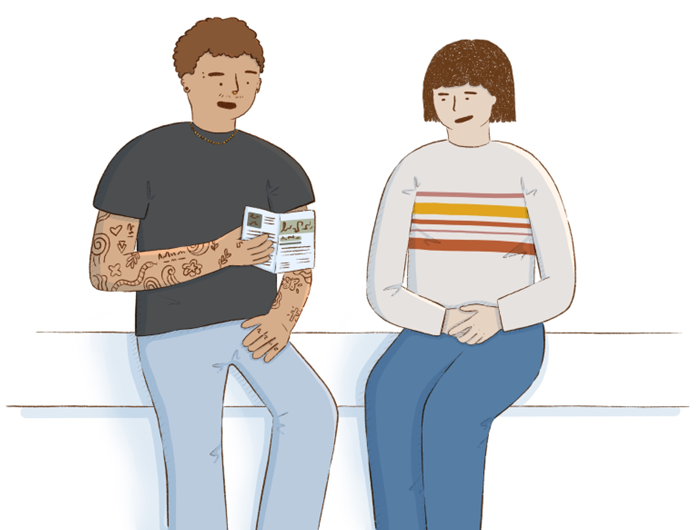The information provided on this page is available to download as a printable booklet.
We know that providing personal care for a person living with dementia takes its toll on the health and wellbeing of carers. Very few people are prepared for this. Self-care is vitally important for carers.
Think about what a flight attendant says on an aeroplane during the safety announcement: “Put on your own oxygen mask first before assisting others.” Without taking care of yourself, you limit what you are capable of doing for others.
On this page we suggest things you can put in place to help you stay strong for the longer term.
This page covers:
- Looking after yourself
- Asking for advice and help
- Carers Assessment
- Breaks from caring (respite)
- Family and friends: sharing the care
- Homecare agencies and homecare workers
- Working whilst caring
- Professionals
Looking after yourself
Here are some suggestions to think about:
- Whether it’s as little as two minutes a day, take time to pause and breathe slowly and purposefully.
- If you have a little more time, even if only once a week, find something that calms and energises you – mindfulness, yoga, meditation, walking in nature, going for a coffee, anything that helps you meet the next challenge.
- Join peer support groups and take advantage of any learning and training opportunities to enhance your skills and gain confidence in your ability to connect and communicate with the person you care for.
Return to the tops of the page
Asking for advice and help
Most of us dislike asking for help and advice. Many carers feel that they don’t want to bother busy professionals or they may feel they are letting down the person they care for by talking about them. It can be difficult to admit to finding things difficult. However, supporting another person with personal care is not easy. Many people have not had training in it, they get by using compassion and trial and error and using knowledge of their relationship with the person they are supporting. Being open about your struggles can lead to you being better supported and the person that you are caring for can be treated for any issues underlying the difficulties. It’s always better to do this before things reach crisis point. Keeping issues to yourself can mean neither of you get the right help.
Top tips for asking for help and advice
- If you are stumped by a particular issue or certainly if you feel that you or the person you are caring for are at risk then please do talk to someone, for example a good friend or member of your chosen family.
- Think about if a good friend of yours described what you are going through, what advice would you give them?
- Ensure that your GP knows that you have caring responsibilities. This means that you should get priority when asking for help or appointments. This is the case even if your GP is different from the person you are supporting.
- Also ensure that your employer knows that you have caring responsibilities. They may be able to offer further support.
- The charity Carers UK has useful resources for carers who are employed, e.g. flexible working, carers leave (including recent changes in law about entitlement). Visit the Carers UK website for more information www.carersuk.org
- The charity Dementia Carers Count has web pages on a Virtual Carers Centre and a support line. The charity also offers Counselling support to carers. Visit their webpage www.dementiacarers.org.uk
- The charity (TiDE) runs the session, ‘You can’t pour from an empty cup’ for carers. Find out more at www.tide.uk.net
Alternatively, for professional advice phone any of these helplines: Alzheimer’s Society 03331 503456; Alzheimer Scotland 0808 8083000; Dementia UK 0800 888 6678; Dementia Carers Count 0800 652 1102. Nothing that you talk about or ask will shock or embarrass people on the other end of the helpline.
You may think that you are the only person ever to have experienced the problem you raise, but be assured the people on these helplines will likely have heard it before. They may not be able to solve the problem but talking it through often really helps.
If you are fearful for your safety then it is very important that you seek help and support. In the first instance, this should be to remove yourself from the situation and contact the police (999).
If you feel that you may do the person you are caring for harm – or if you have harmed the person – then contact your social worker or your GP for advice and support. The section on professionals may also be helpful.
In the following short clip, Roy talks about his experiences of getting advice and help while caring for his wife.
Return to the tops of the page
Carers Assessment
If a person carries out regular unpaid care for someone else then they are entitled to a Carers Assessment of their own needs. In England and Wales, these are carried out by the Local Authority’s Adult Social Care department. The Local Authority sometimes contracts this out to another organisation such as Age UK. The assessment takes the form of a conversation with a trained person who will explore your situation and how caring impacts on you. They will also see whether there is any support you need or can be offered to help you continue to care.
Find out further information from the NHS and Social care website www.nhs.uk and search for the social care and support guide.
A number of charities offer free help and advice about Carers Assessment including: Carers UK’s free helpline on 0808 808 7777; Age UK’s free helpline on 0800 678 1602 and Independent Age’s free helpline on 0800 319 6789
The situation for carers in Scotland is different due to the Carers (Scotland) Act 2016, which provides the following rights:
- A duty for local authorities to provide support to carers, based on the carer’s identified needs which meet the local eligibility criteria.
- A right to an adult carer support plan and young carer statement to identify your needs and personal outcomes. This is available to carers of all ages, no matter how many hours of care they provide.
- A requirement for local authorities to have an information and advice service for carers which provides information and advice on, amongst other things, emergency and future care planning, advocacy, income maximisation and carers’ rights.
- A duty on the NHS to inform and involve you if the person you care for is discharged from hospital.
The Carers Charter sets out these rights, you can find them on the Carers Scotland website www.carersuk.org
Each Local Authority area in Scotland has a dedicated Carers Centre to support local carers, find more information at www.careinfoscotland.scot
In Northern Ireland, information on Carer’s Assessment can be found on the NI Direct Government Services website www.nidirect.gov.uk
Return to the tops of the page
Breaks from caring (respite)
Having a break from caring is essential for your own health and wellbeing, but can be hard to achieve, depending on your circumstances. Many carers get to a point of exhaustion and find it difficult to know where they can ask for help and support.
Trying to put an arrangement in place before you reach that point can help you and the person you support. Taking even small amounts of time for yourself to have a mental or physical break can help you provide better care in the longer term.
Breaks can take different forms. On a day-to-day basis taking even a short time to have a walk, do a hobby or sit and watch the birds can help to reduce stress.
For longer periods, you could considering asking a trusted family member or friend/neighbour if they can support, either directly with the person or by taking on other tasks to free up some time.

Some charities offer befriending visits to spend time socially which gives time for carers to do something for themselves at home or go out. Local information is available through local authority social care or dementia advisors. It could be that there is a local dementia support café or group that the person you are caring for could go to. People sometimes feel worried about trying something new, so having a one-off visit together allows you to see if it’s for you.
Some people can find that transport is a problem to get to organised meetings and this is a familiar issue to those running groups. Ask group organisers if there’s any support they can offer or if there are local taxi firms they work with, who have a good understanding of people living with dementia, who could make planning your journeys easier.
There are also the more formal options through a Carers Assessment, which should consider your own personal health including your physical, mental and emotional needs. The Carers Assessment should give you the opportunity to discuss the support that you need to continue caring, including breaks from caring. These could be in the form of support at home, or exploring other respite options. It could be that the person could have care at home whilst you take a break, or that the person spends time staying in a care home or respite care facility whilst you have time at home or a holiday.
Sometimes the effort to arrange breaks can feel stressful in itself or it doesn’t work out as you hoped. This doesn’t mean it won’t go more smoothly another time. It can be helpful to chat to a friend or a helpline to get support and ideas about this.
Consider contacting a local Dementia Café or a Dementia Meeting Centre meetingcentres.wordpress.com
Talk to the helplines: Alzheimer’s Society 03331 503456; Alzheimer Scotland 0808 8083000; Dementia UK 0800 888 6678; Dementia Carers Count 0800 652 1102 to see if they have information about national and local charities offering support.

Return to the tops of the page
Family and friends: sharing the care
When it comes to family, there is no one type. Family means different things to different people. Not everyone living with dementia has any living family and may not be in touch with family they do have for various reasons. Some people have a strong ‘chosen family’ or a close group of friends when they are not in contact with their biological family.
Some family members may live with the person they support, live apart or at a significant distance. Even when living close to the person with dementia, some family members feel unable to be involved in personal care giving, due to travel, work pressures, other caring responsibilities and other commitments. It may be that the relationship they have with the person they support, makes them feel unable to support them with personal care.
Friends can react in ways that can be very helpful or unhelpful. Sometimes they may avoid the person with dementia. Many people do not know how to cope with hearing about a diagnosis of dementia and are fearful. This fearfulness can leads to avoidance and the person feels abandoned.
Often, personal caregiving falls to one or a few family members. In some instances, this can result in overwhelming feelings of responsibility. Family members who play a significant role in personal caregiving may experience an impact on their health and wellbeing. On some occasions, they may also have feelings of resentment, affecting wider family relationships.
Top tips for getting family and friends on board
If you find yourself in this situation then it may be worth considering the following:
- A family meeting to discuss sharing out some of the caring tasks can be helpful. If this can be established on a regular basis (for example once every 3 months) then the roles can be reviewed and plans made for holidays and special occasions.
- Although the personal care giving role may not be possible for some, other tasks such as finances, house maintenance, social occasions, food and clothes shopping may be more manageable.
- Requesting specific time limited help, e.g. taking on the online shop for the next 3 months, might help people provide help without feeling overwhelmed.
- Share educational leaflets, websites and helplines that you have found useful with other family members and friends.
- Trusted friends of the person you are supporting may also be willing to offer help if asked about specific areas. People will often say “Let me know if I can do anything to help!” Take them up on the offer with a specific request. If they can support the person to do things they enjoy together, it can give you a break. Let the friend know about what to do if the person becomes distressed.
Return to the tops of the page
Homecare agencies and homecare workers
Having paid help provided within the person’s own home is an option that many family carers have as a way of helping them to continue caring for the person. This can take many forms from befriending, to care with specific tasks such continence, washing or bathing, through to live-in care. One size does not fit all.
Care at Home is classified as Social Care and an assessment of need can be made by Social Services (Adult Social Care). In England, a financial assessment will be made if someone meets the criteria under the Care Act. If they have funds over a particular threshold then they have to pay the costs of care at home in full. If they have below this amount then they will have to pay part of the cost.
Care at Home is sometimes provided directly by Social Services or more usually through Home Care Agencies (also known as domiciliary care). Homecare Agencies are regulated by the Care Quality Commission. You can search the CQC website for inspection reports www.cqc.org.uk

In Scotland, personal and nursing care is free to anyone so long as they have been assessed as needing it through a needs assessment. There is variation between councils around what counts as personal care, but it will generally cover:
- Help with washing, oral hygiene and getting dressed.
- Help managing continence.
- Assistance with eating, managing and preparing a specialist diet (such as pureeing foods).
- Help to move around indoors.
- Help with simple medical treatments, for example changing dressings or applying creams.
Help with housework, laundry or shopping or services outside of your home, such as the cost of attending day care centres, are not defined as personal care services and may be chargeable.
These services can be arranged by the local authority and are subject to a financial assessment. Search the Government Scotland website for the Free Personal and Nursing Care questions and answers www.gov.scot

Top tips for finding and getting the most out of Homecare Agencies
- Shop around for the right care company for you.
- Consider asking questions such as:
- Will we have a consistent Homecare Worker?
- What dementia training do your Homecare staff have?
- What checks do your Homecare staff have, before they start and whilst working for you?
- If there is a change of Homecare worker, how are they prepared to support their new clients?
- What if we do not like or get on with our Homecare worker?
- Can I have access to the care notes staff make of their visits?
- How can we communicate changes in need or update the care plan if either the care service and/or we feel that things have changed?
- A Homecare Agency should complete an assessment of your wants and needs, creating a care plan that captures the things that are important to you.
- The Homecare Agency should then select a Homecare worker(s) who they feel would work well with you and your routines.
- Supporting different Homecare staff to understand your relative and personalise personal care routines is important to ensuring that all goes smoothly.
- It can take time for the person to accept care from a stranger. Give it time. When possible, be there to warmly greet the Homecare worker when he/she arrives the first few times. This can help reassure the person with dementia to feel this is a friendly person rather than a stranger.
Return to the tops of the page
Working whilst caring
Many people will be working in a job, either full or part time, whilst also providing care for someone living with dementia. This could be caring for a parent (or sometimes two) or spouse with dementia or perhaps a neighbour. We often see carers now supporting several people with dementia in their family and social networks.
When you are working, this can present many and varied challenges. When we think about providing personal care for a person with dementia, there are many things to think about if you are also in employment and working too. It can be difficult to balance your employed working hours and the personal care needs of the person living with dementia. It may feel like when they most need you to support their personal care, whether that is washing and dressing in the morning or managing continence, you seem to be pulled in different directions as you need to be ‘at your desk’ to earn a living at these very times.
There will be times when you might need to rally others to help you. Of course, this may also present you with feelings of guilt, in that ‘you should be doing this for your mum’, or ‘they will feel embarrassed if I ask a neighbour to help them dress’.
The person you care for will have their own wishes and preferences for personal care as their needs increase, however, these need to be balanced with what is both practicable and possible.
There are various benefits and supports available to both them and you, such as attendance allowance, which may enable you to recruit someone to support their personal care needs and also allow you to continue to work. You also have rights as a carer to enable you to continue to care for the person with dementia.

Top tips for working whilst caring
- You have rights as a carer of a person with dementia to benefits such as, flexible working hours and arrangements.
- If you are not sure what you are entitled to as a carer then there are services and resources that can advise you, such as the Admiral Nurse Dementia Helpline 0800 888 6678
- The charity Carers UK have useful resources for carers who are employed, e.g. flexible working, carers leave (including recent changes in law about entitlement). Access the Carers UK website for more information www.carersuk.org
- Get advice on whether the number of hours you work affect any carer related benefits.
- There may be the option to work from home at times, known as ‘hybrid working’.
- Think about developing a contingency plan for times you are working and there are personal care needs that arise unexpectedly, this may include urgent carer leave (see your employee handbook or ask your line manager).
- Try not to automatically refuse any help offered by others. There is often something they can do, even if it is not directly involving delivering personal care. They can order things that you need on a regular basis or undertake other tasks to lighten your load, such as shopping and cleaning.
Return to the tops of the page
Professionals
There may be several different professionals that you will need to talk with to gain support and advice in supporting the person you care for. For any health-related care needs, the starting point is usually the person’s GP, who will be able to make any onward referrals as needed (for example to the district nurses or the continence team). For other more general personal care support needs, the person’s local social services department will be the first port of call. The health and social care system can appear disjointed and fragmented, which can make it challenging for you to join up all the varying supports a person may need.
Top tips for working with professionals
- It can be helpful to keep a note of who you have spoken to, what their role is, and how to contact them again if further help is needed or the care they initially set up for you requires increasing. Having a notepad for this or a list on your phone can help you keep track.
- If there is an Admiral Nurse service in your area, they may be able to support in ‘joining up’ the health and social care systems for you, so you get the right support from the right team.
- In some cases, it may be hard to talk directly to the professionals involved in the person’s care. This can happen particularly if there are issues around the capacity of the person with dementia in their ability to consent to information being shared between you and the professional.
- It can be helpful for the person with dementia to let their GP know that they are happy for any information about them to be shared or discussed with their family carer or supporter, soon after being diagnosed.
- If the person you look after is with another GP practice, make sure you are identified on their record as the person’s main carer; this should ensure that you have some priority when you contact the surgery for help.
- Consider setting up a Lasting Power of Attorney (LPA) giving an appointed person(s) the legal power to make decisions on their behalf.
- In the case that the person with dementia no longer has capacity to make those decisions, the GP and other professionals should still be able to share information with you in the person’s best interests, and it is considered best practice that this should happen.
Professionals and what they do
There are many different health and care professionals that can provide practical advice, interventions, equipment and aids. This includes:
- General Practitioner (GP): They can assess and advise around changes in health. They can also refer onto specialist NHS services.
- Bladder and Bowel Health (Continence) Service: They provide a specialist assessment and a personalised plan for people with complex continence needs and advise about pads and continence aids.
- District and Community Nurses: these teams are often linked to GP surgeries. They provide advice and treatment to patients at home for a range of needs including wound care.
- Psychiatrist: they are medical specialists in the assessment and treatment of psychiatric disorders. Most people with dementia will have been seen by a specialist in the psychiatry of ageing during their diagnosis. They usually work in specialist multi-disciplinary teams alongside community psychiatric nurses.
- Clinical Psychologists: They can help with assessing abilities and understanding the cognitive strengths and needs of the person living with dementia. They can also help with understanding how you can support someone who is becoming distressed on a regular basis. A GP can make a referral for this service.
- Community Mental Health Nurse (sometimes called Community Psychiatric Nurses or CPNs): these are specialist NHS nurses who support and advise people with dementia and have specialist skills in managing distress and difficulties. They work within the specialist community mental health team for older people which will include psychiatry and psychology.
- Social worker: They work for the Local Authority in the department of Adult Social Care and deal with all aspects of social care. They can help if you need help at home. They will undertake financial assessment to advise on the cost of this. They also advise where there is a risk to safety to individuals living with dementia.
- Admiral Nurses: They are specialists in the care and support of people and families affected by dementia. Some NHS Trusts have Admiral Nurse services where you can call directly. Their free help line can offer direct advice from Admiral Nurses about personal care issues and dementia 0800 888 6678
- Occupational Therapist (OT): They can assess and help with specialist equipment that can make it easier to manage at home. Their aim is to improve daily functioning, social participation and wellbeing for people with dementia. They can also teach new strategies and approaches for family members and carers in respect of personal care, communication and general activities of daily living. They work either for the NHS or social services and referral is usually through your GP. Some work in private practice.
- Physiotherapists (Physio): can assess and help with movement, pain management and muscle strength. They work for the NHS and referral is usually through your GP. Some work in private practice.
- Pharmacists: They usually work in Pharmacies and are specialists in the use of all medications including side effects. They can offer free advice on which medicines are likely to impact on all aspects of personal care.
- Speech and Language Therapists (SaLT): These specialists can help in the assessment of people with dementia with complex communication issues or who have problems with eating, drinking and swallowing.
- Post Diagnostic Support Link Worker: In Scotland, everyone who is diagnosed with dementia will be assigned a named link worker to support people (and their families) to understand the illness, maintain community connections, meet other people with dementia, and help them with future planning and decision making.
- Dementia Advisers: In England and Wales many local services will have people designated as dementia advisers who can help provide support in the earlier stages of dementia post diagnosis. Your GP should tell you about how this works in your area.
- Social Prescriber: A number of GP practices have a service that supports people to access a range of non-medical local services and activities within the community. Many of these will be suitable for people living with dementia.
